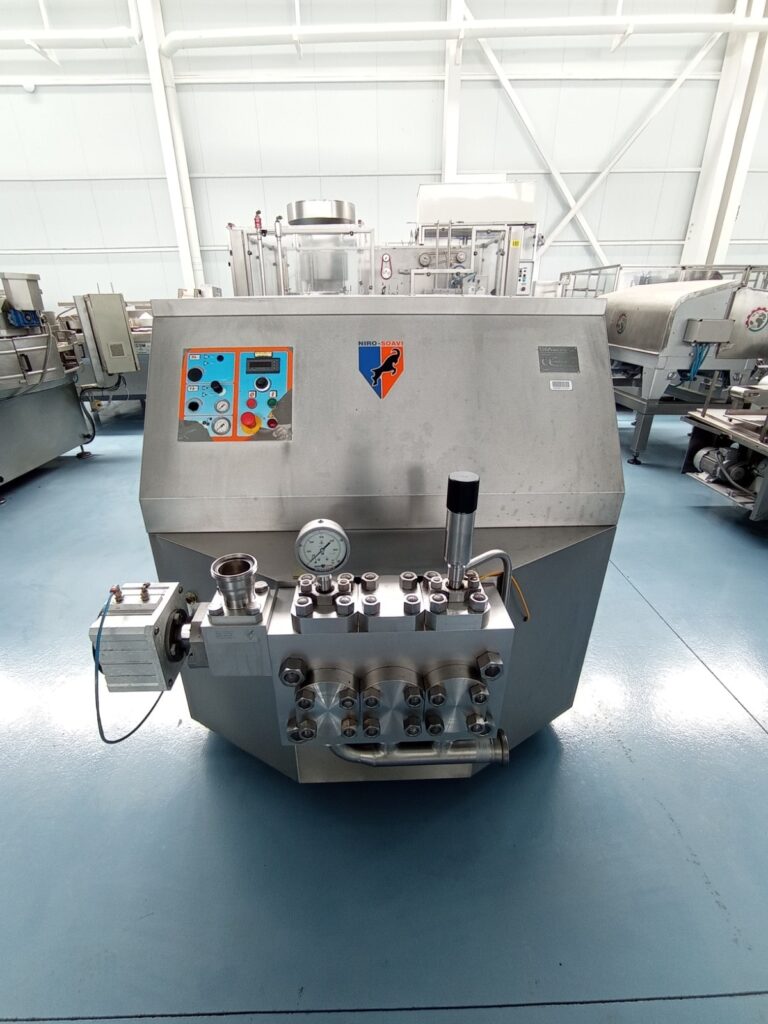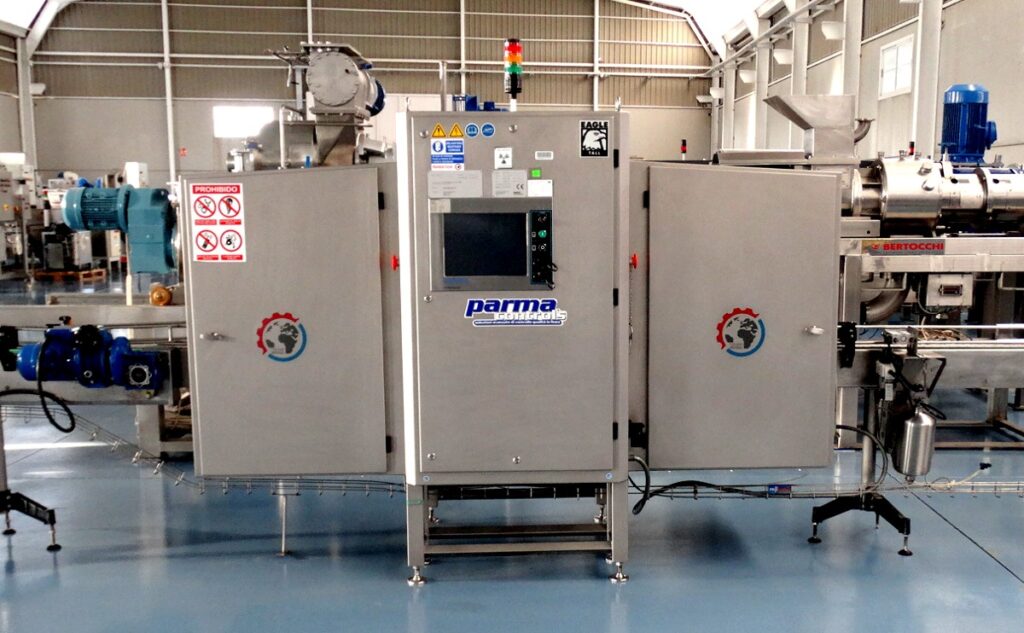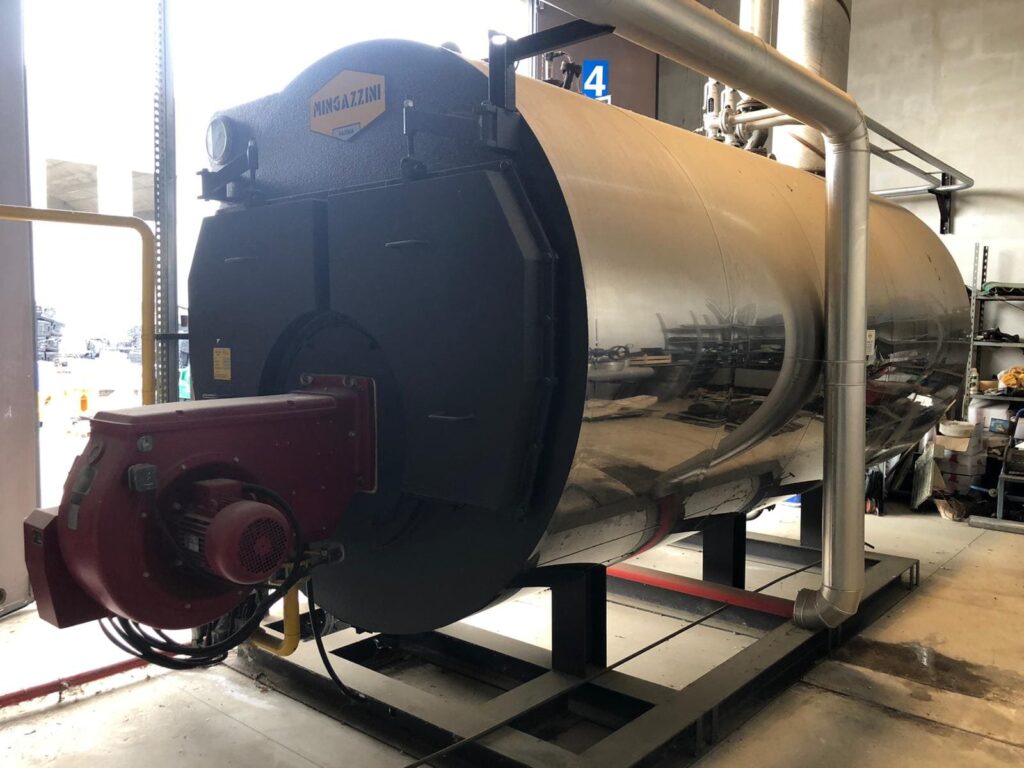
In order to achieve those uniform and soft textures that buyers so much appreciate in our products, we need to include the so-called homogenizers in our lines.
Homogenization is one of the most important processes that take place within the food industry, as well as in other like the chemical or the pharmaceutical industry.
WHAT IS AN HOMOGENIZER?
An homogeniser is the machine that allows the size reduction of globules and fat particles contained in food products. In other words, it reduces the variations between two heterogeneous substances, it makes them uniformly consistent and reduces the separation after mixing.
As a result, we obtain micrometer-and-nanometer-sized particles. This size will always vary depending on the characteristics of the product in question and the results we aim to achieve.
Homogenizers stabilize fat emulsions and disperse solids in aqueous solutions. In this way, we prevent certain parts of the mixture from surfacing and/or falling by reason of differences in density.
We are therefore not only talking about mixing particles, but about a more complex process that may integrate emulsion, homogenization, solubilization, suspension, dispersion and breakup of solid particles.
FUNCTIONING
To carry-out this size-reduction of particles, the product is pressured-pumped through valves and pistons in monobloc compression blocks. These valves will help us define the desired flow and pressure.
Pistons may work electric or hydraulically. According to the characteristics of our process or products, they may also incorporate cooling or heating.
From there, the liquid product then goes to a manifold and arrives at the homogenization valve (or homogenization head). Homogenisation can be achieved at mid-pressure or high pressure.
This homogenization valve consists of an impact head and an outlet head. There is an annular gap between the impact and the outlet heads. The products flows within this gap.
Precisely, that high-speed dynamic flow between the two heads is what generates the micronisation and dispersion of particles continuously (through turbulence, cavitation, cutting force and impact).
This process may be one or two staged, depending on the desired results.
DIFFERENCE BETWEEN HOMOGENIZERS AND PISTON PUMPS
At a glance, an homogenizer may be mistaken for a piston pump. Both machines share the same compression monobloc of valves and pistons. However, piston pumps lack of the homogenization valve, since their role is just to push the product.
Usually, piston pumps are used in heat treatment processes with very dense products such as fruits and vegetables. Fruit or tomato purees and concentrates are some examples of this.
SECTORS THAT MAKE USE OF HOMOGENIZERS WITH FOOD AND BEVERAGE
Since they improve the quality of the final product and its consistency, as well as reduce processing times, homogenizers are used within a large number of industries:
HOMOGENIZERS WITHIN THE FRUIT AND VEGETABLE INDUSTRY:
Fruit juices and pulps, fruit concentrates, smoothies, tomato juice, tomato products, tomato paste, etc.
HOMOGENIZERS WITHIN THE SAUCES INDUSTRY:
Sauces, ketchup, mayonnaise, soy sauce, etc.
HOMOGENIZERS WITHIN THE DAIRY INDUSTRY:
Milk, soy milk, almond milk, yoghurt, liquid yoghurt, cream, condensed milk, cream cheese, ice-cream, etc.
HOMOGENIZERS WITHIN THE OIL INDUSTRY:
Animal oils, vegetable oils, butter, margarine, etc.
HOMOGENIZERS IN OTHER INDUSTRIES:
Syrups, flavors, egg, chocolate, liquor, baby foot, honey, spices, jelly, sweets, desserts, gelatins, additives, sugar dissolution and salt dissolution, gum or thickening agents dissolutions (to prevent the formation of lumps), pharmaceutical, chemical, sanitary, biotechnological sectors etc.
WHAT IS THE REASON OF HOMOGENIZING?
There are many reasons why our products must go through homogenization before reaching the supermarkets shelves.
Some of them are directly related to the product whilst some others refer to global challenges and trends.
1. HOMOGENIZATION EFFECTS ON THE PRODUCT
Generally speaking, the homogenization improves the viscosity, texture and mouth feel in all kinds of creams, juices and beverage. In the same way, it extends the shelf life of such products.
By reducing the fruits and vegetables to smaller particles, there is also an improvement in terms of color and flavor. In consequence, this allows us to reduce the use of de colorants and flavorings.
Besides being perfect for the final product presentation as we have just seen, it is also important to note that the resulting emulsions greatly facilitate the subsequent process of products.
In the case of dairy products, homogenization avoids the fat separation in the final product and prevents the milk from skimming. In the yoghurt industry, it also avoids the whey separation.
2. GLOBAL CHALLENGES AND TRENDS
The manufacturer of homogenizers Tetra Pak points out the interesting role of homogenizers when they turn the challenges of the current food context into opportunities.
In the first place, we see there is a market and consumers growing interest in natural products: “no-additives”, “no-preservatives”, “organic” y “non-GM”. The role of many additives is to increase viscosity. By contrast, homogenization allows to do it with pressure and pectins without depending on additives.
In the same way there is also a great demand of vegan products. The number of milk substitutes (such as rice milk, almond milk, soy milk…) hasn’t stopped growing, and homogenizers are strictly necessary for their manufacture.
Something similar happens with drinking yoghurts, smoothies and juices. These are all products thought to be healthy. For their manufacture, it is necessary to carry out a liquefying phase that homogenizers can perfectly undertake.
LARGEST STOCK OF HOMOGENIZERS AND PISTON PUMPS IN THE MARKET
As we have seen, homogenization is a purely mechanical process in which particles contained in food products are broken and dispersed to obtain homogeneous mixtures.
In Maquinaria Conservera Tomás Guillén we have the largest stock of industrial homogenizers and piston pumps in the market.
We work with brands synonym of excellence in the market of homogenizers: GEA, NIRO SOAVI, TETRA PAK, BERTOLI… All of them are mechanically tested to ensure optimal conditions.
We are ready to respond to productions ranging from 100 litres/hour to 20.000 litres/hour. We work with high and low viscosity food products and with aseptic designs.
We search for high-quality and hygienic-designed equipment that also reduce energy consumption -by reducing the pressure. All of this keeping in mind the importance of an easy maintenance and a low noise level.
Do not hesitate and contact us to get an efficient and high-performance homogenization.




